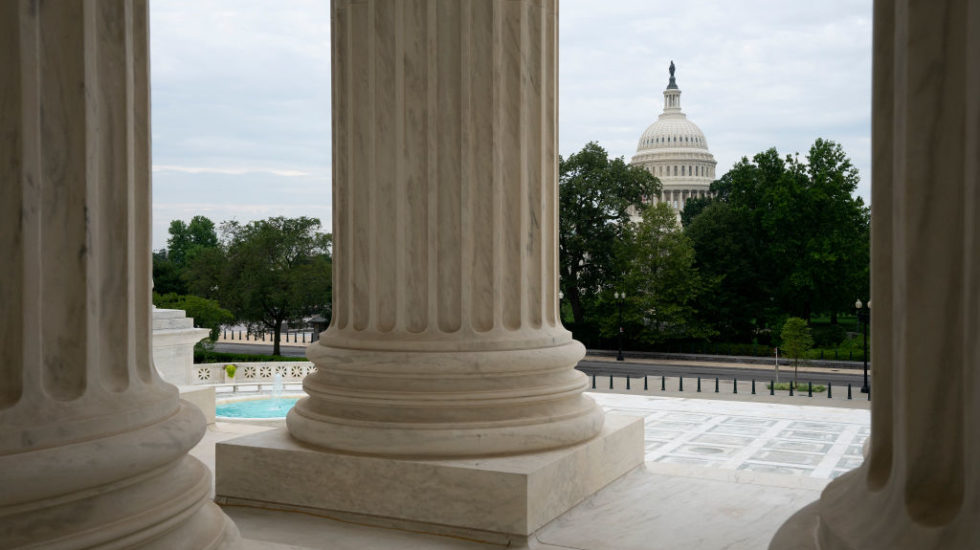In this unique election year, literally plagued by the Covid-19 pandemic and a resulting economic slump with historic unemployment, plus furious demands for racial justice, Americans are naturally focused intently on the presidential campaign.
But the death of Supreme Court Justice Ruth Bader Ginsburg on Friday, and the tug-of-war over when and how to choose her replacement, have forced a shift in perspective — a shift likely to impact the battle for control of the Senate.
So the findings of a major new poll render it more significant than usual.
The Reuters/Ipsos poll, released Sunday, “found that 62% of American adults agreed the vacancy should be filled by the winner of the Nov. 3 matchup between Trump and … Biden, while 23% disagreed and the rest said they were not sure,” Reuters reported.
Eight out of 10 Democrats — and half the Republicans surveyed — agreed that the appointment should wait until after the election, the poll found.
But that’s not what Trump or Senate Majority Leader Mitch McConnell are promising. The president says he’ll announce his nominee to fill Ginsburg’s seat on the day after her memorial service in Washington; McConnell has vowed to seek a vote soon after, potentially just a few weeks or even days before Election Day.
“If Mr. Trump announces his choice on Friday [Note: Saturday may be more likely], that would leave just 39 days until the election, which would be the quickest confirmation since … 1981,” reports the New York Times, adding that since 1975 “confirmation on average has taken about 70 days.”
The Republicans hold a 3-seat Senate majority, which could evaporate if close races go the Democrats’ way.
As usual, Trump’s “base” is solidly behind him: at a raucous rally Saturday night in Fayetteville NC, he told supporters he’ll nominate a woman to the High Court. They responded with apparently impromptu chants of “Fill That Seat!” And by Monday, t-shirts bearing that slogan were available on a Trump Campaign merchandise site.
But Democrats may have the edge when it comes to choosing senators on Election Day — including the fact that “of 35 Senate seats up for grabs in November, 23 are held by Republicans and 12 by Democrats,” as CNN reports, leaving the GOP more vulnerable to losses in such an intensely partisan election.
So which Republican senators might stand up against their own leadership on the Supreme Court nomination?
Sens. Lisa Murkowski of Alaska and Susan Collins of Maine “have publicly objected to the idea of a vote before Election Day, meaning Mr. McConnell could only afford to lose one more member of his party, given his slim, 53-to-47 majority,” says the Times.
That leaves attention focused on Sens. Mitt Romney of Utah, Cory Gardner of Colorado and Charles Grassley of Iowa, “who were seen as possible holdouts but [have] said nothing publicly about their intentions,” the Times says.
Turning to the wobbly re-election prospects of certain incumbent senators, a Democrat tops the list.
Alabama Sen. Doug Jones won a 2017 special election to fill an empty seat, flipping it blue in his deeply red state — largely because of his inept and scandal-plagued Republican opponent, Roy Moore. This year Jones faces a much more formidable challenge in Trump-backed Tommy Tuberville, who beat former Attorney General Jeff Sessions in a primary runoff.
Nearly all the other most vulnerable senators are Republicans, including Cory Gardner of Colorado, who is seeking a second term in his decidedly “purple” state. He faces former Gov. John Hickenlooper, who’s been criticized for ethics violations, but has an edge based on his experience. Hickenlooper leads in the polls.
In Arizona, Sen. Martha McSally, an appointee who has never won a statewide election, faces popular former astronaut Mark Kelly, who has drawn millions more in campaign contributions. (Kelly’s wife is Gabby Giffords, the former senator who turned anti-gun crusader after an assassination attempt.) Kelly’s biggest concern is that Arizona voters are likely to go with Trump at the top of the ticket, potentially a boost for McSally, but again here, Kelly has a small lead in most polls.
North Carolina’s Sen. Thom Tillis is counting on major support from likely Trump voters. He faces Democrat Cal Cunningham, a former state senator who raised nearly three times as much money as Tillis in the second quarter of the year. Cunningham and Tillis are running neck and neck.
In Iowa, Sen Joni Ernst is running her first re-election campaign; she spoke at the Republican National Convention, but is in a tight race against Democrat Theresa Greenfield, a self-described “farm kid” known for her strong support for Social Security. Greenfield may be helped by slipping support for Trump and other Republicans, but again, it’ll be close.
Finally, there are two of the most prominent Republicans in the Senate — Susan Collins of Maine and Lindsey Graham of South Carolina, both veteran incumbents.
Collins has tried to cultivate the image of a moderate, but that was undercut — at least in Democrats’ eyes — by voting for the Trump tax cuts for the wealthy in 2017, and to confirm Brett Kavanaugh as a Supreme Court justice in 2018. She faces Democrat Sara Gideon, speaker of the state House of Representatives.
Graham has a significant advantage: Trump is virtually certain to win South Carolina in November and should provide him with a coat-tail boost. His underdog opponent is Democrat Jaime Harrison, who has enjoyed major fund-raising success and appears to be giving Graham a run for his money. Some polls show the two tied, in a state where no Democrat has won a statewide race since 1996. Currently, polling on the race shows it as a tossup.



